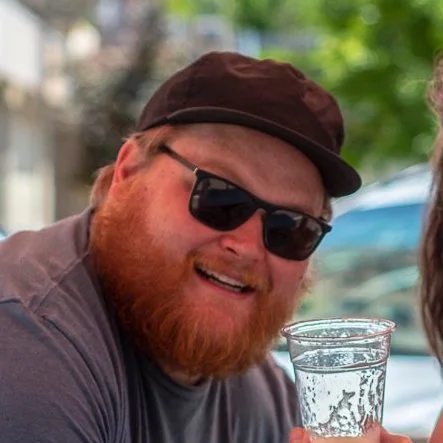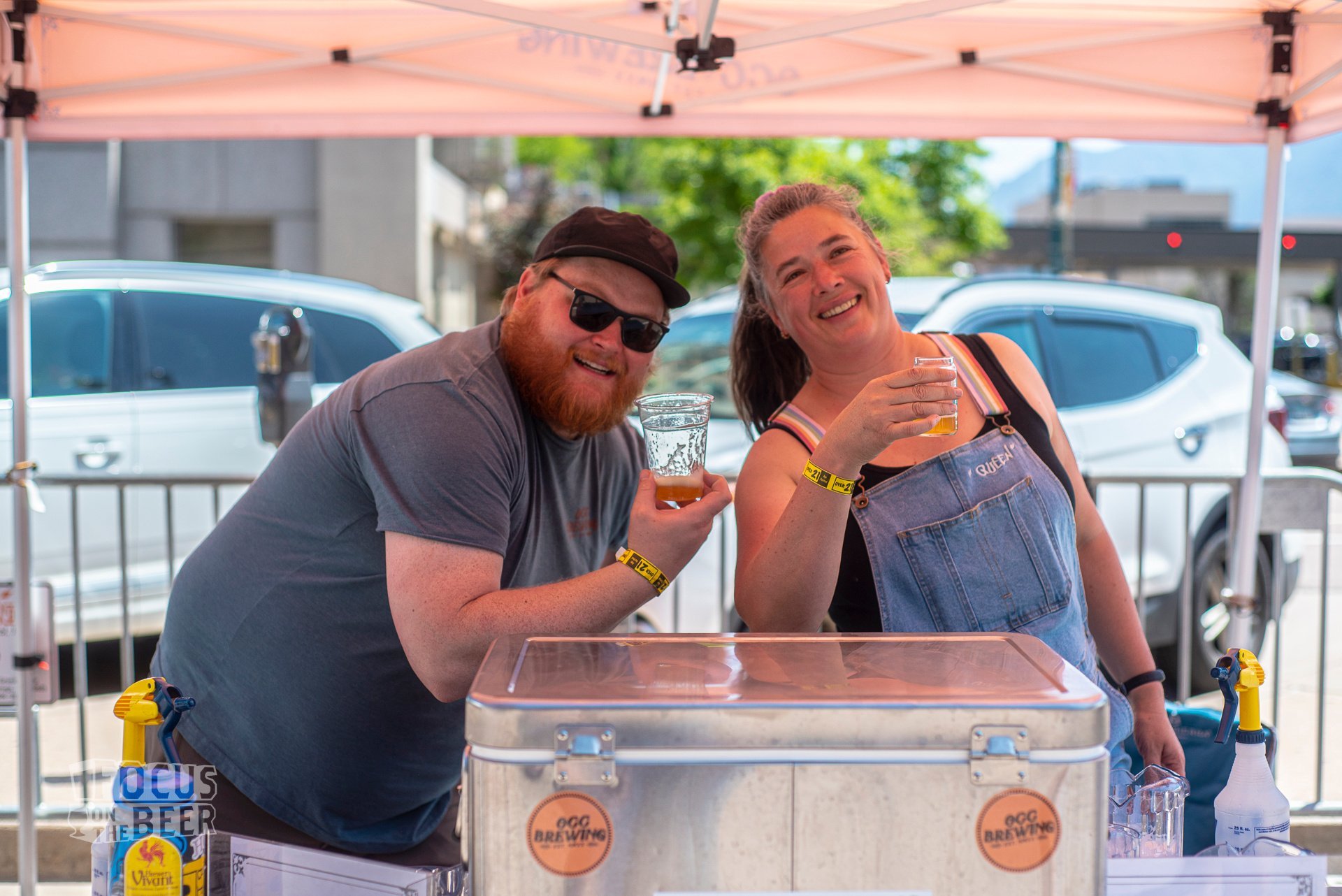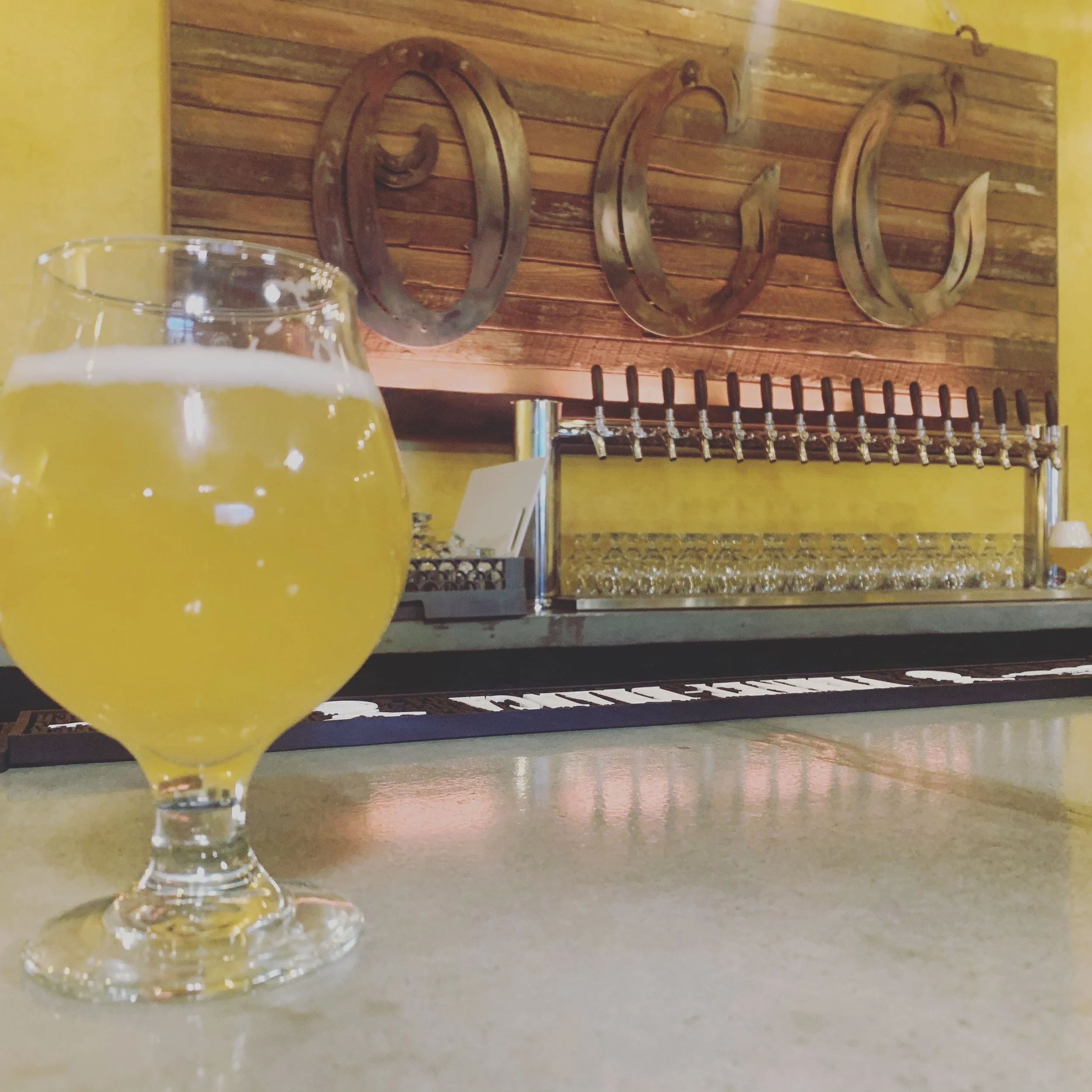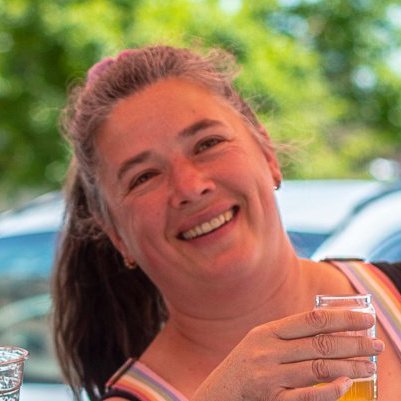OCC Brewing: A Peregrine Paradigm
par·a·digm
/ˈperəˌdīm/
noun
a typical example or pattern of something; a model.
"OCC Brewing is a paradigm for restaurant breweries in Colorado Springs"
In two short years, OCC Brewing has become a paradigm for restaurant breweries in Old Colorado City, holding down the central part of Colorado Ave. After pivoting at opening to a more pandemic-friendly menu, they’ve proved the restaurant brewery model works and works well, if you can stomach it.
We had the chance to sit down with the OCC crew — head brewer Kyle Stevens, Chef Malikei Hetherington, as well as Owners Dan and Claire Ramos — to chat about their past two years, and look to the future. If you don’t get the Peregrine reference, birds are ever-prevalent at OCC as both Dan and Claire are wildlife biologists—plus it almost was OCC’s name…almost!
Let’s start on the beer side.
Kyle, for the uninitiated, can you give a little backstory into how you came to OCC?
Kyle Stevens, Head Brewer
I come from Michigan originally. I started my brewing career at a well respected, but very small, brewery that doesn't do a lot of competitions or anything like that up in Northern Michigan. They're in a high tourist area so they get people from all over the state and country visiting for summertime, but it was crickets come winter. After a few years, I grew tired of the 70 hours during the summer and then like 20 hours plus a few bar shifts in the winter. ‘
I thought to myself, I just got to go somewhere where there's a little bit of a steadier job and so I ended up at Bells in Kalamazoo—where I originally went to college. Because of that, I was very familiar with the area and I still had a few connections in the industry. So I brewed at Bells for a few years and when my wife's career brought her out here to Colorado, I just kind of had to up and leave.
Head Brewer Kyle Stevens with Owner Claire Ramos at the Phantom Canyon Block Party earlier this summer.
Did you find it easy to get a job here, or is the Springs a little weird in that sense?
Kyle: It definitely took me a minute to find a job locally, that’s for sure. I got a ton of call-backs from breweries in Denver, but I really didn’t want to need to drive an hour North to Denver if I could help it. After a bit of pounding the pavement, I ended up finding BSI, who saw my resume and called me up like the next day. In a stroke of luck, a guy I knew back from Kalamazoo was working the phones there and helped put a good word in for me.
Basically I came out here after several years of brewing in Michigan. I had started on a three barrel system and then I had worked my way up to at Bells working a 200+ barrel brewhouse—I would brew 1200 barrels beer a night, easy. It was nice to come and get out here and kind of work my way back to a smaller system where I had a little bit of say, because when you're brewing at a brewery as large as Bells, it's Two Hearted all day every day, that's all you're making. And you're not allowed to make changes to those recipes, you know what I mean?
Brewing at a large brewery, you don't get the creative aspect of the job nearly as much you're following a recipe. That was part of the reason I was really excited to come to a smaller place where we kind of get to work and develop recipes based on what we have on tap and what we're into right then. To just have a little bit more creative freedom than you have when you're in a production environment like that is refreshing.
Anything at a big level becomes soul sucking to an extent, so I’m happy to be back full circle to pub brewing. It's just like finding a good balance of doing this job at the highest possible level I can, but I also allowing that creative element to show through, which is why we all kind of get into brewing and cooking and everything in between.
Speaking of “pub brewing” what does that term mean to you here at OCC? What drives the creative process for you?
Dan: Pub brewing, to me is ever evolving.
Dan Ramos, Owner
Like Kyle said, you're not just making the same batches over and over. You're not sticking to flagships day in and day out. Part of my reason for having this model was to allow my creativity to keep going.
So we have 16 taps and 2 are flagships. Our Pilsner is a flagship and our West Coast IPA is a flagship, but besides that we look at the brewhouse and think “what looks good? What season is coming up?” We have 14 taps to play with and that is ever evolving. We revisit recipes, but even then we're tweaking them to improve over the last batch. That’s pub brewing in a nutshell.
Kyle: No pumpkin beers, though…
I'm into the seasonality of beer, and I like to be informed by that. I probably skew traditional more than Dan in a lot of ways. So I like my lagers to be lagers, my marzen to release as close to Oktoberfest as humanly possible, but there is some give and take with the seasonality of customers, too. People don't want to drink Oktoberfest into November. Everybody you talk to, it happens like that. So there's got to be an eye to keg stock and there's also got to be an eye towards cool ingredients or if we have a really good item in the kitchen that's very seasonal—we want to make sure that we're pairing something with that or with that in mind.
Dan: Right now? We're kind of tweaking everything. We're playing with finishing PH of our IPAs and seeing if we can really address that to make them just a little bit brighter.
Kyle: And we have our Peach sour that flew off the shelves last year. That's a seasonal Palisade peach beer for us. And so those sorts of things are always fun to bring in. This year, we made some tweaks to that recipe, and I think I personally like it a lot better this year. I thought it was great last year. But going back to what he was saying earlier about pub brewing is like taking a recipe that you already thought was pretty good and then being “I want this and I want this,” and just kind of letting the recipes evolve with seasonal available ingredients and our customers are really reacting well to it.
What’s the hardest thing, beyond COVID, that you’ve had to deal with as a brewery?
Claire Ramos, Owner
Claire: Wearing all the hats. Dan’s basically an electrician and a plumber now.
Dan: Yeah, this is technically a new build, but you wouldn’t know it based on how many things I have to fix every day.
Let’s not go down that rabbit hole…Back to the beer!
In our opinion, your Westside Pils is one of the best I’ve had here in the Springs. Tell us a little more about that brew and how you choose for beers to become flagships…
Dan: Early on, when Taylor Donner left, there was a short period of time where I was brewing. Westside Pils was the first beer I brewed solo at OCC, and it's been our number one selling beer since. I modeled the recipe after a South German Pilsner, similar to Augustiner or Spaten. The beer is a lot more hop forward than Northern German Pilsner, plus it’s a little drier and crisper. Another thing that’s really unique about ours is we use this French hop called Triskel.
Whoa, I haven't heard of that hop. Tell me more!
Dan: No, not a lot of people have. Even the hop suppliers are like, “what? I don't think we have that.”
There was one hop supplier in the whole country that had it last year, and I bought everything they had to make sure that we could keep this train going. Initially, I used it in a Saison and liked how it tasted. With that beer, I thought: “this would be a great pilsner hop.” And we just ran with it. It's a daughter of Strisselspalt, if you’re familiar with that hop varietal.
A lot of breweries in town are just going the food truck route recently. What made you decide to have a kitchen and be a true brew pub?
Dan: I think the hardest part is embracing the restaurant model and being able to say, all right, let's put someone behind the kitchen that can crank out really good things and match what you're putting out, beer wise. But I am a numbers guy and I feel like my financial projections going into the whole project were pretty spot on. That said, coming out of COVID, it’s a brand new world. And so I've talked to Jay Gust and other restaurateurs around town and they're like, yeah, you're kind of lucky in some ways, because all the stuff that used to work for us doesn't work now.
So everybody's trying to figure out, what this new paradigm? So I'm just kind of figuring it out. But how do you run a successful restaurant? And that's what we are first. I mean, obviously we're a brewery, but we're a restaurant. And how do you run a successful restaurant in light of where food costs are, what it takes to keep good staff on labor costs? That is something I haven't figured out yet. That's the hardest thing. I don't know if I thought that was going to be smooth sailing, but I had a Pre-COVID data that told me what it was supposed to be.
That was the first year and nine months…the kitchen was my albatross and it didn’t allow me to focus on any other aspects of the business because I didn't have a real manager or leader in there. Maybe this year I can focus on the owner-aspect of the business, thanks to having Chef Malikei Hetherington in the kitchen since Territory Days. Since then it’s allowed me to focus a little bit more on marketing and growing our local business. I think that's an aspect that we're missing right now.
Chef Malikei, can we learn a little more about how you joined OCC?
Chef Malikei: Yeah, so I've been in the restaurant industry for 18 years now. Started when I was a kid washing dishes, and worked my way up to line cook. I eventually moved to Portland, OR and studied with chefs out there and then moved back to Kansas City and got my first head chef job at the age of 25. Been going non-stop ever since.
From there, I kind of bopped around. I was the executive sous chef at a brewery in Dallas called BrainDead which provided me quite a bit of brewery experience with food and everything—learning about beers and how to pair beer and food—that kind of harmonious relationship that people really strive for.
Came down here[to Colorado Springs] about a year ago. It's actually funny because after COVID I decided to retire as a chef and pursue my art career. I took the job here just to pay bills while I put myself through a tattoo artist apprenticeship, and it kind of just fell in my lap: Right time, right place, perfect people.
Dan and I, our brains work so similarly. We'll sit and collaborate on a dish and throw things back and forth to come up with these beautiful, beautiful concepts together.
How would you describe your approach to food, and how does your food complement the beers that Dan and Kyle are putting out?
Chef Malikei: I am a huge fan of fusion. I like taking different components and different ingredients that typically or traditionally don't go together and find a way to combine their best parts. I love playing with flavors, colors, and things that are adventurous to make comfort food, or what I call it. There's always a component that you know and that you're comfortable with, but then I kind of take it and push it a little bit more too.
My hope and goal is to get you to get outside of your box a little bit, but in a way that's still kind of familiar.
With the beer, Kyle and I usually sit down once a week to work on a curated cheese board. I'll pick out cheeses, and then he and I sit down, try them all, we look at what's on the tap list, taste stuff, and he and I pair the cheese with our beers every single time together. The goal is to also run a special that goes with any special release to help elevate the food that we have, but also help sell the beer because we're brewery first and foremost. So the way that I'm trying to run the relationship is the food is a supporting actor, right. And the beer is the lead character, but I always want to make sure that they flow really well together, always and consistently.
As a restaurant, tell me a little bit about your approach to that part of the business…
Dan: I'd always said that we wouldn't have that kitchen component unless I had a chef as a partner. We did at first, but thanks to COVID, we lost our chef and had to pivot at the last second. We were so far down the rabbit hole at that point that I looked at Claire and we said: “We can cook. We're going to write a menu what works well in a pandemic.” So sandwiches it was.
We were still doing almost everything to-go at that point too, with the in-house regulations changing weekly. So our menu that came out was very sandwich heavy, and we didn't really have, I guess, more of a classically structured menu with your entrees and things like that.
That's what I think the biggest addition that Malikei has brought out with it's only three weeks old at this point, our new menu, they put three entree items on there. I think we've also we made some waves our 1st November of business with Vegan Week, and it almost broke our kitchen. But we got a really good reputation among the plant based community. We only had a couple vegan items, but also vegetarian food. And we've since partnered with Aaron Posey, did a vegan beer dinner this last winter and our new chef also specializes in plant based foods.
You don't have to be a vegan or a vegetarian, but I think there's more omnivores looking for that alternative. And I think that's a big evolution in our menu, that maybe we're ahead of the curve a little bit. Not to toot our horn too much, but I feel like, especially with Chef Malikei, we're doing some cool things.
Malikei: Personally, I'm plant based. I have been for long time now, like 14 years. So for me, when I go out places, if they have more plant based options, I'm going to go there as opposed to a different place. Our menu is a way of opening the door more to the vegan/vegetarian community by having those options, which is also getting people to try our beer more and growing a bigger consumer base out of it. Because if it's just a meat potatoes kind of dinner menu, the vegan and vegetarian crowd is not even going to come and try the beer because they're not going to be able to eat.
I don't want to just like a plain old salad when I'm coming to drink beer. I need something a little bit more sustaining. And so I think that we've made a lot of headway on that. I even noticed this last brunch, the amount of plant based options that were flying out the window was super great. I've had a lot of people who aren't plant based ordering my plant based stuff and saying like, wow, super, super good. Our Queen Kristina’s Cauliflower steak is a vegan entree that I just added, and it's very flavorful and it's rich and it's filling and it's healthy, but it's not meat and it can still complement many different styles of beer at the same time.
Beyond the anniversary this Sunday, are there any fun things you’re most excited for? Any bottling or packaging going to happen soon?
Chef Malikei: We will be bottling, but not beer. We are going to start bottling hot sauces.
One of my winter projects is doing some Colorado-inspired OCC hot sauces. Each sauce will have a locally-grown pepper and will pair perfectly with our beer. Back during COVID, I owned a hot sauce company called Salt Jaw, and so we're kind of bringing some of those flavors back. That way we have our own hot sauces that we serve with our food that goes with our beers, using Colorado grown ingredients, supporting local farms, our neighbors and everything else. And also just hot sauce and beer go so well together.
Claire: Also, we have recently formed a friendship with some folks who've been getting us barrels so there'll be more barrel-aged beers coming down the road.
Dan: Yeah, a student of Claire's randomly at one point was like, hey, would you want a bourbon barrel?
Claire: We responded: Yeah? Why do you have a bourbon barrel? And it turns out they go and pick single barrels of whiskey for their whiskey club. So after selling the whiskey to their club, they have these empty barrels. Ok, we're like, now we want one.
Recently, they gifted us a Frey Rranch barrel and in June we went up to Old Elk in Fort Collins to help pick the barrel that we get to use in the end. It’s fun!












